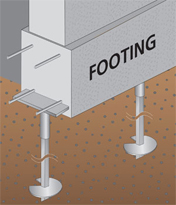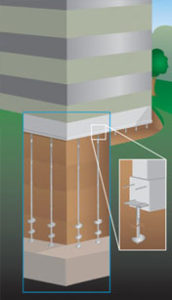Many homes in North Carolina are built on slabs, and that’s because in more southern areas we usually can’t have crawl spaces or basements because they will flood or leak repeatedly. The ground is too soft and there’s too much rain and building a basement or crawl space just isn’t worth it. Therefore, most homes will be built on a slab. These may eventually need slab repair as they can succumb to damage like cracks, water, or leveling issues.


As you might expect, cracks will be the most common slab repair on slab foundations. This is usually due almost entirely to improper preparation. If the soil is not compacted properly, this can lead to a myriad of problems. Number one, the soil will be too loose and cause water to permeate it, thus making it heavier and easier to push against the slab. The slab can crack from this uneven pressure, and those cracks can then let in water. This will weaken the slab over time and can cause big damage. Additionally, if the soil becomes too dry or too wet, this can cause cracks as well because it’s unexpected wear that the slab cannot handle.
Another common slab repair is that of uneven settling. How do you know you have it? You may find that the floors of your home are sloping. Set a pencil on the ground and see if it rolls away. If it does, there’s most likely sloping going on which leads us to uneven settling. Settling can occur due to many reasons, but most of these are due to improper compaction or soils that are causing the issue.
Garages and chimneys are usually built on a slab as well, and they can have the same sort of damage that a slab foundation for a home would have and require slab repair as well. If you notice a crack in the garage floor or a leaning chimney, slab repair may be the answer to the problem.


Helical slab brackets are used to lift the slab, either mechanically or hydraulically. Helical slab brackets work in the same way as underpinning brackets: as support for the footing of a foundation. They can be used in two ways, on either a poured grade or floating slab. After the anchor or pile is installed, the helical brackets are then installed through the slab. These brackets are the preferred method of contractors and engineers. The helical slab brackets have a load capacity to meet the needs of any home, and they range from 8 kips to 40 kips.
If you’re experiencing slab repair problems, it might be time to call Tar Heel Foundation Solutions. We can get you on the way back to a healthy and stable home that will last for years to come. Call us today for a free estimate!